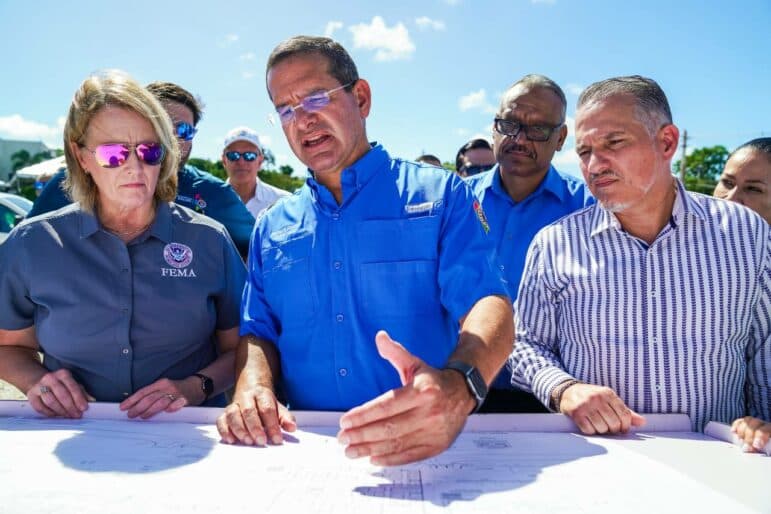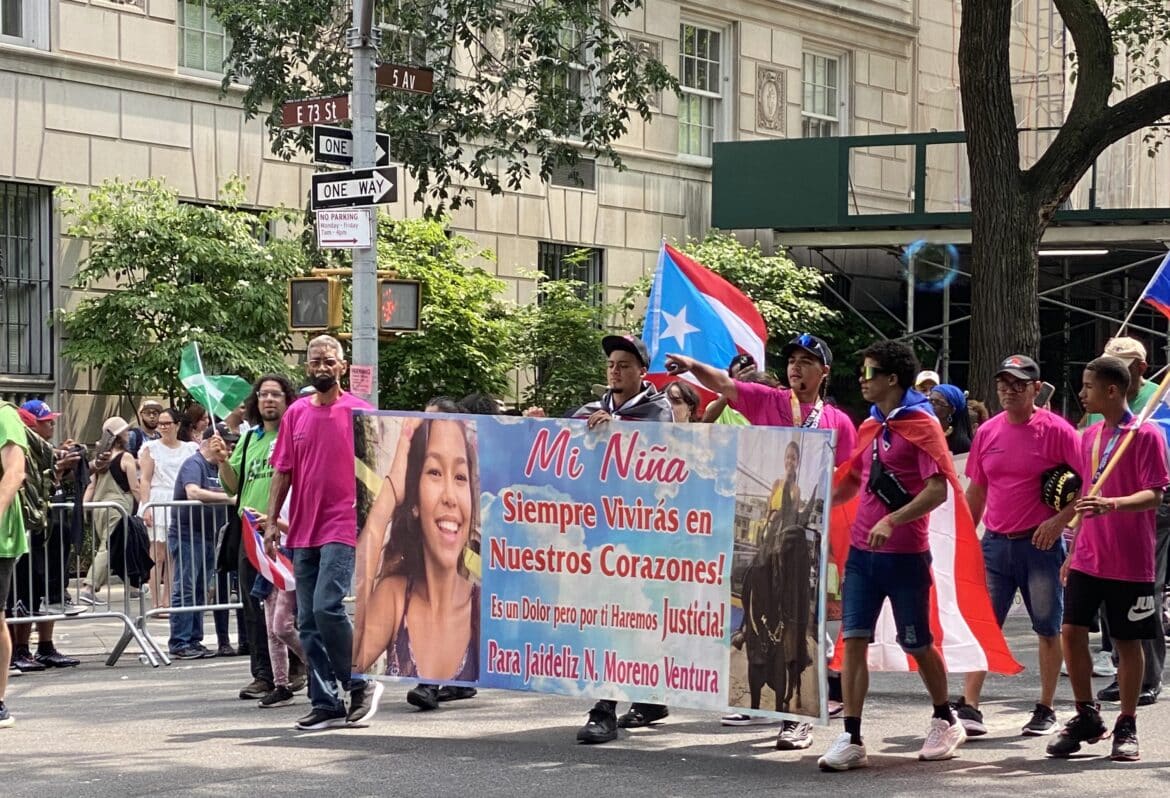The government of Puerto Rico and the Department of Health suffered a judicial defeat in their attempt to stop the lawsuit for damages filed by Jaideliz Moreno Ventura’s family after the 13-year-old teenager’s death on the island municipality of Vieques, due to lack of medical services.
The Court of Appeals revoked a decision of the San Juan Superior Court (TPI, in Spanish), which in August 2022, paralyzed the claim in which the parents, grandparents, and an aunt allege that the teenager’s death in 2020 was due to the negligence of the Susana Centeno Vieques Family Health Center and its medical staff. The family members allege that the defendants failed to comply with the minimum standards for operating a health and medical care facility applicable to her treatment.
Jaideliz’s relatives also point out in the lawsuit that the state of health services in Vieques represents a violation of human and civil rights, by not guaranteeing adequate care to deal with medical emergencies, such as the one that took the teenager’s life.
The Susana Centeno Family Health Center temporarily operates from a shelter, after Hurricane María left the previous structure inoperative back in September 2017. Although the Federal Emergency Management Agency (FEMA) obligated $39.5 million to construct a new health center, Vieques residents are still waiting to complete the project six years after the disaster. The previous structure was demolished, but it was only this Wednesday that a symbolic groundbreaking ceremony was held.
The family also sued, in their personal capacity, doctors Rafael Rodríguez Mercado, then Secretary of Health; Dora M. Berenquer Macaya, administrator of the center, and physicians David Heal and Mario E. Paulino Payano, their respective spouses and legal partnership, as well as several professional services entities.
The main claim made by Jaideliz’s parents, grandparents, and aunt is “that the abandonment of public health in Vieques be decreed unconstitutional and contrary to human rights.” They request compensation for damages amounting to $250,000 for each one.
The government hides behind bankruptcy
Since the beginning of the lawsuit, the government of Puerto Rico has unsuccessfully sought the lawsuit’s dismissal. More recently, in April 2022, the Department of Justice, as the government’s legal representative, asked the court to stop the case. It argued that, once the Debt Adjustment Plan came into force on March 15, 2022, an injunction (permanent order) also went into effect, ordering the suspension of claims against the government. The government of Puerto Rico alleges that the case should be heard by the U.S. District Court for the District of Puerto Rico.
On August 5, 2022, the TPI agreed with the government, determined that it had lost jurisdiction over the matter, and paralyzed the case.
But, on October 20, 2022, federal Judge Laura Taylor Swain, who oversees the Puerto Rico government’s bankruptcy case under PROMESA, modified her order and authorized litigation in claims against the government that did not exceed the compensation limits in the Claims and Lawsuits against the State Act, which reach $75,000 per plaintiff and $150,000 in total.
Jaideliz’s family, through their attorney Linda Backiel, cited this order in a motion for reconsideration before the TPI, establishing that, although the amounts claimed in the lawsuit amount to $250,000 for each co-plaintiff, it does not specify how much each defendant must pay, including the government of Puerto Rico. The Superior Court denied her request, maintaining the stay. However, they turned to the Court of Appeals, which agreed with them and revoked the TPI in a ruling of August 29, 2023, allowing the proceedings to continue.
“For me, [the determination of the Court of Appeals] shows that there is a sensitivity and reasonableness within the judicial system, which can understand that the scope of the Commonwealth’s bankruptcy cannot eradicate the rights of all citizens to vindicate their civil and human rights,” said Attorney Backiel in an interview with the Center for Investigative Journalism (CPI, in Spanish).
“For Jaideliz’s family, it means that her memory is still alive with the people of Puerto Rico and, therefore, the suffering and need of the Viequenses to have a real hospital and not another CDT [Diagnosis and Treatment Center],” she said.
Backiel emphasized that the family’s main interest is establishing a hospital in Vieques that can offer urgent treatment in complicated cases.
The medical facility that FEMA authorized in Vieques does not meet the criteria to be a hospital.
“Honestly, money isn’t what matters to the family. Nothing can compensate for the life of your daughter. That legal remedy [compensation of up to $75,000 per plaintiff and $150,000 in total] is the only thing that the Justice system believes is available to compensate for those damages and we aren’t going to refuse to claim them,” she said.
“The Commonwealth has said, ‘We’re going to build a hospital in Vieques’, but they have requested a CDT, not a hospital. In addition to demolishing what was there, the plans are to put in a CDT, with dialysis and other things, but it isn’t a hospital, and it isn’t a substitute,” she stressed.
The Department of Justice did not appeal the Court of Appeals ruling, so the case will proceed at the TPI.
Government insists on misleading rhetoric about medical facilities in Vieques
Knowing that the term “hospital” is incorrect for the new health center designed for Vieques, Gov. Pedro Pierluisi, Resident Commissioner in Washington, Jenniffer González, and other Puerto Rican government officials, namely Rep. Carlos “Johnny” Méndez, have insisted on using it.
A hospital is not the same as a medical clinic or a diagnosis and treatment center, according to current building codes in Puerto Rico. In addition, FEMA made a monetary obligation to construct a diagnostic and treatment center. If the government of Puerto Rico really wanted to build a hospital, it would have to request an amendment, the CPI confirmed in 2021.
A hospital is a structure that offers medical care 24 hours a day for more than five people who cannot “care for themselves,” according to the 2018 International Building Code, which is used by the government of Puerto Rico. Meanwhile, a clinic offers services during part of the day to outpatients who can care for themselves after receiving medical care.
According to the World Health Organization, hospitals are licensed institutions with at least six beds, are permanently staffed by at least one doctor, can offer inpatient accommodation, and can provide active medical and nursing care.
Groundbreaking six years after Hurricane María
After Hurricane María, the reconstruction of the Susana Centeno Family Health Center was announced as the first project on the list of permanent works in FEMA’s Public Assistance Program.

Courtesy photo | La Fortaleza
However, it wasn’t until a week after Jaideliz’s death in 2020, following multiple protests, and after a long bureaucratic process between FEMA, the government of Puerto Rico, and the municipality of Vieques, that the federal agency obligated the money for the project: $39.5 million.
On August 19, 2021, Pierluisi announced that the CDT would be ready in mid-2024. For this, he said, construction would begin “the second quarter of 2022.” However, although demolition is completed, construction has yet to begin in the third quarter of 2023.
This past Wednesday, Pierluisi attended the “groundbreaking” ceremony along with FEMA administrator, Deanne Criswell, the mayor of Vieques, José Corcino, and administration officials.
Costs almost twice the initial estimate
The initial cost estimate agreed upon by FEMA, the municipality of Vieques, and the government of Puerto Rico was $44 million, and FEMA’s monetary obligation covers 90% of that amount.
However, almost four years after the money was obligated, a pandemic, increases in the price of construction materials, and a labor shortage, the total investment totals $85.5 million. This figure represents that, of the $44 million that the government of Puerto Rico and the municipality of Vieques initially had to contribute, they now must cover about $36.5 million.
“What dictates the cost of a project is when it is designed and put on the market and, really, that is when you know what the real cost is,” said Infrastructure Financing Authority Director Eduardo Rivera Cruz in an interview with the CPI a week before the Governor’s press conference in Vieques. “We issued a transparent bidding process, different contractors came, and the reality was that the cost for this type of facility had increased significantly,” he added.
FEMA committed $43,494,580; the Department of Health has already allocated $1.5 million; the municipality of Vieques would contribute $2,078,320, and the Office of Management and Budget allocated $33,652,689. The remaining amount, $4,832,730.40, will be covered with CDBG-DR funds.
“Back in 2020, FEMA approved the funds for the hospital’s construction, but, due to lack of resources from the municipality, because a match is always required, since the municipality did not have the funds, this was paralyzed,” said Pierluisi at the press conference to announce the start of construction.
“During this time, we have faced several challenges, including identifying the funds, so that the hospital could be built, for two reasons: construction costs increased tremendously, and, although FEMA had given us an allocation, no one imagined that we would have the inflation that we had in Puerto Rico in 2020, 2021 and 2022,” the Governor said.
A word game
The director of AFI has insisted in several interviews with the CPI that the project remains on schedule, even though the exercise of laying down blocks to build the structure only began, symbolically, this past Wednesday, with the groundbreaking act.
Rivera Cruz said that demolition is part of the construction process, so it would be wrong to say that construction had not begun.
He said the construction design is already completed. Pierluisi announced that the work will take between 22 and 28 months.
Beyond the groundbreaking, the work that must begin this November to complete the first phase consists of moving the land, construction of a parking lot, dialysis area, obstetrics, and trauma treatment room, and installing the generator, cistern, and electrical substation rooms. Pierluisi expects this part of the center to be operational by the end of 2024.
The second phase, which includes the main building, heliport platform, as well as an emergency room and complementary pharmacy, imaging, and laboratory services, will be completed in April 2025, the Governor said.
The outpatient clinic to offer specialist services, such as mental health and dental, is the third phase, which is estimated to be ready by the end of 2025.
The firm Caribe Tecno was contracted for the health center’s design and construction, for $76 million.
The project is scheduled for completion in 2025. Eight years will have passed since Hurricane María, and Jaideliz Moreno Ventura — who lived through the disaster in Vieques at the age of 11 and died at the age of 13 — would have been 18 years old.



